Donald Trump welcomed the New Year in his own inimitable manner: surrounded by his social and political clan in the opulent surroundings of his exclusive Mar-a-Lago club in Florida, accompanied by a representative gathering of all segments of US society – from movie stars to billionaires.
“It will be a fantastic 2018,” Trump assured his guests, as he entered the gilded ballroom at Mar-a-Lago, accompanied by the fixed grin of first lady Melania Trump and the tailor’s dummy that passes for his son Barron, and predicted the stock market would continue to rise and businesses would come to the US at “a rapid clip”.
All this was music to the ears of his well-heeled guests who are slavering at the prospect of the juicy profits and tax cuts that their hero has so generously promised to deliver. It was a truly unforgettable scene that would not have been out of place in The Godfather.
The year 2017
Before we welcome the birth of the New Year, however, we first have a duty to bury the old one, after performing a rigorous autopsy on its corpse. “I think that this year is probably the biggest year for political risk since the end of the World War II,” stated Brian Klaas, fellow in Comparative Politics at London School of Economics, interviewed by CNBC in January of last year.
He was not far off the mark. Just think for a moment about the kind of upsets that have occurred in the last 12 months. The year that has just passed into history saw yet another series of political earthquakes. And, despite the confident crowing of the latest occupant of the White House, the year 2018 is unlikely to be any easier for world capitalism.
Trotsky once described theory as the superiority of foresight over astonishment. But the year 2017 saw a great deal of astonishment, and not least among the so-called experts of the bourgeoisie. 12 months ago, who would have thought that the British Conservatives would do so badly in a general election, which they entered with a 20 point lead over Labour; and the “unelectable” Jeremy Corbyn would end the year as the most popular politician in Britain?
Who would have thought that, by the end of the year, the leaders of the Catalan campaign for independence would be contesting an election while sitting in a Spanish jail, and the president of the Catalan government would be a political exile in Brussels?
Who would have thought that the two main parties in France would not even be present in the second round of the presidential election? And who would have thought that the US Republicans would lose an election in Alabama: a safe stronghold of the conservative religious right wing?
Who would have thought that Mugabe would be thrown onto the scrapheap after decades of dictatorial rule, and that Jacob Zuma would lose control of the ANC?
These are just some of the political earthquakes that have shaken the world in only 12 months. They are highly significant events in themselves. But from a Marxist perspective they are symptoms of the general crisis of world capitalism, which finds its expression in political instability everywhere, including the most powerful capitalist nation: the United States.
Pessimism of the bourgeoisie
The serious strategists of capital often arrive at the same conclusions as the Marxists, although naturally from their own class standpoint. The rosy picture painted by Mr. Trump is not shared by any serious bourgeois analyst – quite the contrary, in fact.
The Eurasia Group, a respected consultancy that advises the capitalists on possible risks on a world scale, in its recently published annual assessment of top geopolitical risks, warns that the world is moving toward crisis and a state of “geopolitical depression” and that the presidency of Donald Trump is itself contributing to instability: accelerating divisions nationally and internationally, and unravelling the global order that has been painfully constructed over a period of decades.
The Eurasia Group expresses the fear that that liberal (i.e. bourgeois) democracies are suffering from a “deficit of legitimacy not seen since World War II”, that the leaders are out of touch with reality and that this political breakdown creates conditions where any major event could have a devastating effect on the global economy and market.
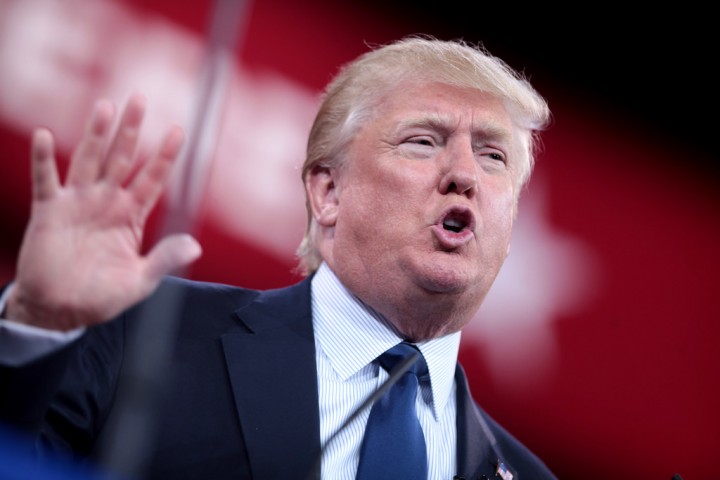 Donald Trump’s election alarmed the bourgeoisie / Image: Flickr, Gage Skidmore
Donald Trump’s election alarmed the bourgeoisie / Image: Flickr, Gage Skidmore
The report begins with a sentence that might be seen as a response to Mr. Trump’s glowing appraisal of the economy (except that it must have been written before his New Year’s party): “Yes, markets are soaring and the economy isn’t bad, but citizens are divided. Governments aren’t doing much governing. And the global order is unraveling.”
And its conclusion could not be more different from that of the Man in the White House: “In the 20 years since we started Eurasia Group, the global environment has had its ups and downs. But if we had to pick one year for a big unexpected crisis — the geopolitical equivalent of the 2008 financial meltdown — it feels like 2018”.
The Trump factor
The year 2017 began with Donald Trump’s assumption of power on 20 January. That in itself was a political shock of tremendous dimensions. It is, of course, incorrect to attribute all the ills of the world to one man. If that were true, then the solution to the present crisis would be simple indeed: get rid of Trump and replace him with a more ‘responsible’ (i.e. Democrat) president. But there is no reason to believe that the situation would be much better under Hillary Clinton or any of the other heroes of the ‘centre’.
The attempt to explain great historical processes in terms of the individual is a trivialisation of history that does not stand even the most superficial scrutiny. Marxism seeks the mainsprings of human history in the deeper processes that unfold far beneath the surface and constitute the fundamental framework upon which human actors play out their roles. But this basic analysis, while ultimately decisive, by no means exhausts the question.
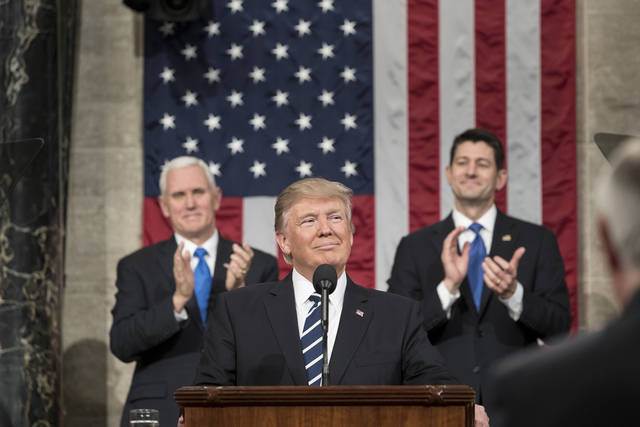 Donald Trump: “an elephant in a China shop” / Image: White House
Donald Trump: “an elephant in a China shop” / Image: White House
If the attempt to explain history in terms of individual protagonists is too simple to be taken seriously, the attempt to deny the role of individuals in history is equally simplistic and false. Marx explains that men and women make their own history, although they do not act with complete freedom and are constrained by objective factors that are beyond their control and even invisible to them. By their actions, individual actors can have a serious effect on circumstances, influencing the outcome of events in one way or another.
Donald Trump is an interesting example of this phenomenon. The ruling class in the United States was not happy with Trump. They remain unhappy, and are trying to get rid of him. There are a number of reasons for this. For over 100 years the political life of the USA was based on two fundamental pillars: the Republicans and Democrats. The stability of the system depended on this balance.
Trump is a multi-billionaire, but he is also an egomaniac and a skilful demagogue. Paradoxically, Trump appealed specifically to the poorest groups. He talked a lot about the working-class – something virtually unheard of in US election campaigns. It was all a lie of course, but when he talked about the closed factories and mines he aroused hope in the minds of desperate people. This struck a chord with millions of Americans who were sick of the system that condemns them to poverty and unemployment.
In reality Trump is just another representative of big business, In fact, he is the real crude and ugly face of capitalism, while the so-called centre is capitalism that attempts to disguise its essence behind a smiling mask. Trump has discarded the mask, and that is why the establishment detests him.
The establishment wondered whether they could control this billionaire maverick whose victory they did not wish but were unable to prevent. They did not have to wonder for long. The 45th US president was in a hurry to make his mark. He had campaigned on a pledge to “do things differently”. He has been as good as his word.
He has succeeded in exacerbating all the contradictions on a world scale: between America and China, between America and Europe and between America, Canada and Mexico. He has intensified the conflict between Israel and the Palestinians and created a frenzied bellicose atmosphere with North Korea that has turned South Korea and Japan into targets for the nuclear arsenal of the “Rocket Man” of Pyongyang.
Trump’s adventures in the field of foreign affairs are surely without precedent in the history of world diplomacy. He does not resemble a bull in a china shop but rather an elephant. His continuous outpouring of outrageous tweets provide noisy background music to the cacophony of jarring, contradictory and frequently incomprehensible foreign policy blunderings that have shocked and dismayed large sections of the establishment at home and abroad.
The doctrine of America First is only a new version of the old isolationism that was always part of the American political tradition. But America’s closest allies are worried that when he promises to “make America great again” he means to make it great at their expense. And they are not mistaken. If previously there were hairline cracks in the so-called western alliance, these have now widened into a yawning gulf.
Eurasia Group President Ian Bremmer and Chairman Cliff Kupchan warn that U.S. global power is “sputtering to a stall” and the Trump philosophy of retrenchment and unilateralism sows confusion among both allies and rivals. Eurasia Group says, “‘America First’ and the policies that flow from it have eroded the U.S.-led order and its guardrails, while no other country or set of countries stands ready or interested in rebuilding it…significantly increasing global risk.” That is a fair summary of the situation.
Radicalisation in the USA
These are really quite remarkable achievements for a mere 12 months in the White House. Trump’s eruption onto the world stage would be quite sufficient to cause serious concerns in the US and international establishment. But there is another reason why the ruling class is unenthusiastic about Donald Trump. Elementary mechanics informs us that every action has an equal and opposite reaction. The fault lines in American society and politics were already there. They were not invented by Mr. Trump. But by his words and deeds he has intensified the sharp divisions in US society and provoked a notable increase in radicalisation.
Trump´s arrival at the White House was the signal for an unprecedented wave of mass demonstrations all across the country. The Women’s Marches probably represented the biggest day of protest in US history. Between 3.3 million and 4.6 million people marched in Los Angeles, Washington D.C., New York, Chicago, Seattle and other US towns and cities. This was the shape of things to come.
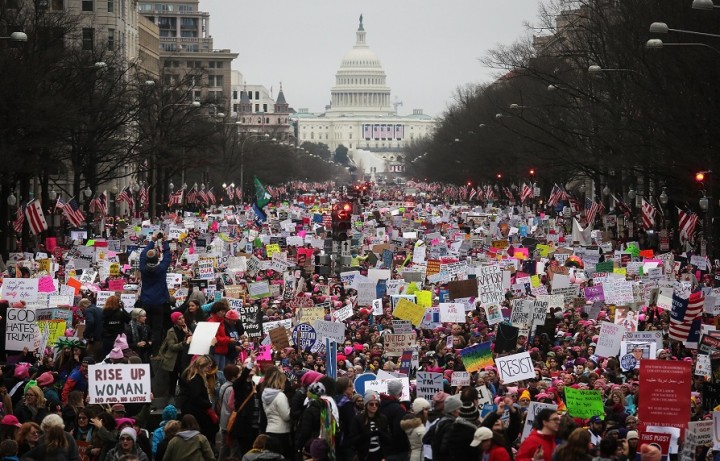 The Women’s March following Trump’s election was the biggest single-day protest in US history / Image: public domain
The Women’s March following Trump’s election was the biggest single-day protest in US history / Image: public domain
The year ended with a staggering Republican defeat in Alabama: a conservative and strongly Republican seat that Trump had won with a margin of 30 percent in the presidential elections. That was yet another political earthquake, and one that was not foreseen by the ‘experts’ or the opinion polls.
It is too early to say how long Trump can survive. His most important support is to be found in the bankruptcy of the Democrats and the delay in a significant movement of the working class. The present administration may drag on, despite the unprecedented spectacle of an open split in the ruling class. When in the past did we see an open conflict between an American President and media, the FBI, the CIA and the entire body of the US Intelligence Services?
Despite the confident predictions of Mr. Trump, the year 2018 will see many more upsets of this type, which are at bottom a reflection of the instability that is a fundamental feature of the present period of worldwide capitalist crisis.
France and Britain
For Marxists the meaning of these political upsets is not hard to understand. The crisis of capitalism manifests itself in a general instability – economic, social and political. 10 years after the financial collapse of 2008, the bourgeoisie is nowhere near solving the economic crisis. All attempts of governments to restore the economic equilibrium have only served to destroy the social and political equilibrium.
We see this in one country after another. Both Trump and Bernie Sanders, though very different, are manifestations of the same phenomenon. So are Jeremy Corbyn, Mélenchon in France, Syriza in Greece and Podemos in Spain. All these things are reflections of the general discontent, anger and frustration that is seething beneath the surface of society. This is causing serious alarm in the ranks of the bourgeoisie and its strategists.
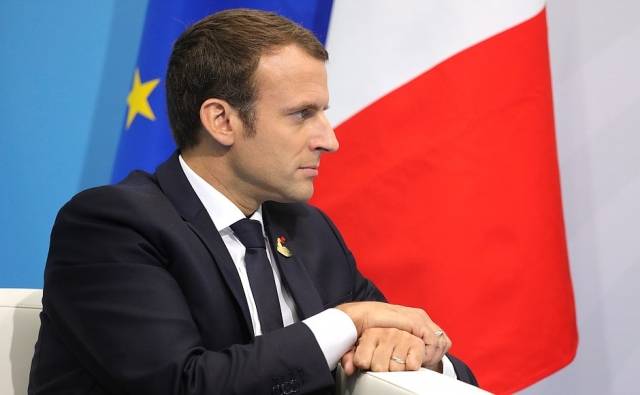
The rise of an “increasingly toxic anti-establishment sentiment” is eroding trust in political institutions in democratic countries, as well as the media and the electoral system in the United States. Weakness in these institutions can lead to instability, authoritarianism, unpredictable policy and conflict.
What we are seeing in the USA and everywhere else is the collapse of the centre. The tiny group of unrepresentative elites who hold power are naturally not happy about this. They correctly see the growing polarisation to the left and right as a threat to their interests.
They were therefore understandably delighted in May, when a little known ‘centre’ candidate, Emmanuel Macron, defeated Marine Le Pen to become France’s youngest president. Not one of the traditional parties got onto the second ballot. The media made a lot of noise about this. They claimed that Macron had won an absolute majority. That is not true. The absolute majority was in fact the 70 percent of people who did not vote for him. Nor did the media dwell on the fact that the most popular politician in France was the left-wing Jean-Luc Mélenchon.
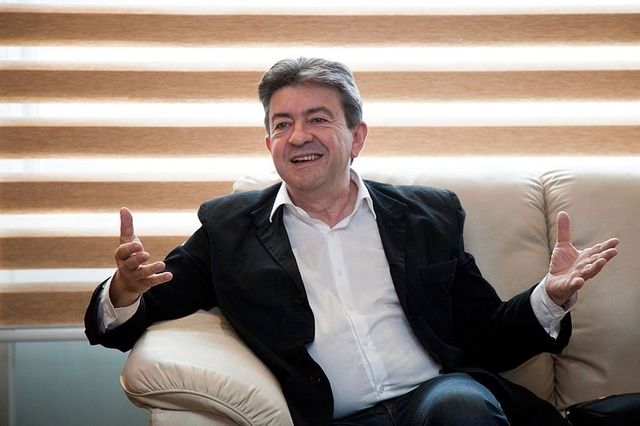 Left-wing Jean-Luc Mélenchon was the most popular politician in France / Image: public domain
Left-wing Jean-Luc Mélenchon was the most popular politician in France / Image: public domain
In reality the political centre is a fiction. Society is increasingly divided between a small group of people who control the system and the overwhelming majority who are getting poorer and are in open rebellion against the system. “Capturing the centre ground” was an idea of Tony Blair (the founder of ‘New labour’ and British Prime Minister from 1997 to 2007).
The idea is childishly simple: to try to find an agreement between parties based on different classes. But there is a small problem. Such an agreement is impossible, because the interests of these classes are completely antagonistic – incompatible, in fact. This antagonism can be temporarily disguised in periods of economic boom, but become glaringly obvious in situations like the present, when capitalism is in a deep crisis.
The June 2016 Brexit vote was Britain’s leap into the dark. That was yet another political earthquake, the results of which are only beginning to be felt now. In a desperate attempt to shore up Britain’s weak negotiating position last spring Theresa May called a snap election. This decision was taken on the assumption (shared by everyone and his uncle) that the Conservatives could not possibly lose.
The opinion polls gave the Tories a lead of 20 points over Labour. The entire media was unanimous that, under the leadership of left-winger Jeremy Corbyn, Labour could never win an election. Let us recall that Labour’s right wing, which has a crushing majority in the Parliamentary Labour Party, have been trying to get rid of Corbyn in every possible way for the past two years with the backing of the media, which organised an unprecedented campaign of vilification against the Labour Leader.
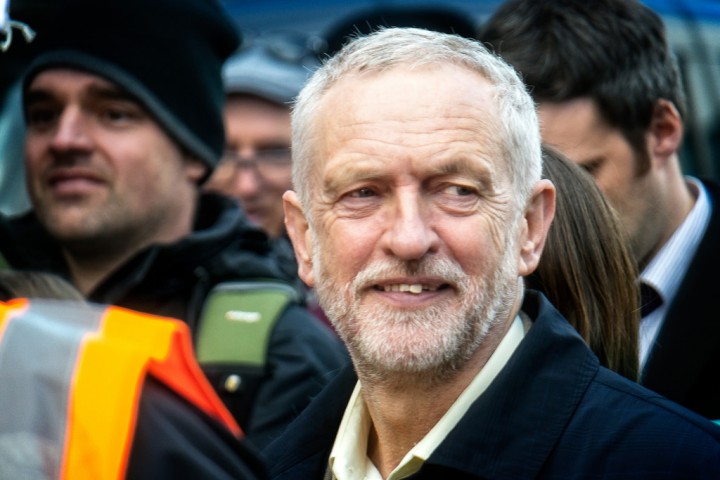 Left-winger Jeremy Corbyn robbed the Tories of their parliamentary majority / Image: Flickr, Garry Knight
Left-winger Jeremy Corbyn robbed the Tories of their parliamentary majority / Image: Flickr, Garry Knight
Their efforts failed. But they were once more preparing to oust him as soon as the defeat of Labour, which they fervently desired and confidently expected, was announced. But to the astonishment of everybody, Labour fought the election on a left-wing programme and surged ahead. The Conservative Party lost its parliamentary majority and the allegedly unelectable Jeremy Corbyn became the most popular politician in Britain.
Not long ago Britain was one of the most stable countries in Europe. Now it is one of the most unstable. The Brexit result and the ferment in Scotland were both symptoms of profound discontent, which existed but found no means of expressing itself. In the person of Jeremy Corbyn this mass discontent has found a political expression that represents a big swing to the left that presents big opportunities for the British Marxist Tendency that alone understood this phenomenon, which every one of the pseudo-Trotskyist sects had denied for decades.
Catalonia
The crisis over Catalonia is a reflection of the impasse of Spanish capitalism and the consequence of the betrayals of Stalinism and reformism that led to the abortion of the 1978 Constitution. That betrayal enabled the rotten Spanish ruling class to preserve important parts of the old Franco regime behind a ‘democratic’ façade.
Now, 40 years later the chickens are coming home to roost. The people of Catalonia have experienced the reality of Spanish democracy when blows from police truncheons rained down on the heads of unarmed and defenceless citizens – men and women, young and old – whose only ‘crime’ was the wish to cast a vote on the future of their country.
The leaders of this movement did their best to persuade the right-wing government of Rajoy in Madrid that they were, of course, not serious about independence at all. They ‘proclaimed’ an independent Catalonia, but also declared that it ‘would not be implemented’. They behaved like generals who mobilize an army, place it on a war footing, provoke the enemy into action and then wave the white flag. A surer way of demoralising the troops cannot be imagined.
But if the Catalan leaders imagined that this manoeuvre would save them from the wrath of their enemies they were sadly mistaken. Weakness invites aggression. The forces of Madrid arrested the main leaders of the independence movement, who found themselves in jail charged with planning an insurrection, abolished the powers of the autonomous Catalan government and imposed direct rule to smash the independence movement. The Catalan President Carles Puigdemont fled to exile in Belgium.
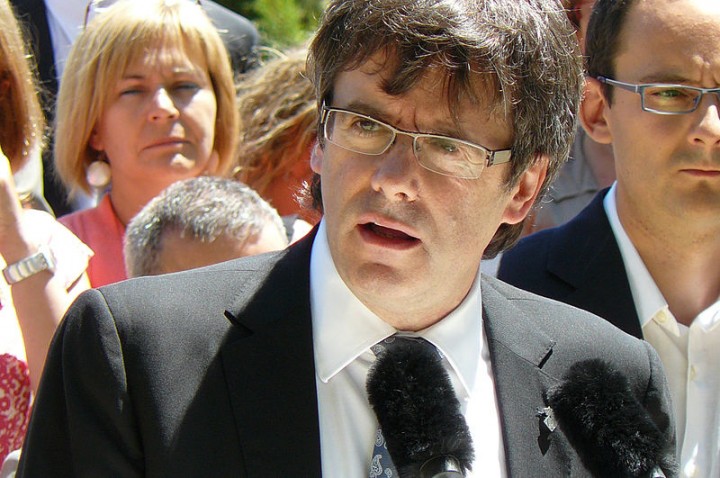 Carles Puigdemont is in exile in Brussels / Image: Puigdemont acompanyat de càrrecs electes de CiU
Carles Puigdemont is in exile in Brussels / Image: Puigdemont acompanyat de càrrecs electes de CiU
The Catalan bourgeois nationalists foolishly imagined that they would get the backing of the European Union, but were soon cured of this illusion. Brussels and Berlin informed them in the most unambiguous terms that an independent Catalan state would not be recognised by Europe. So much for the democratic credentials of the leaders of the EU!
If the ruling PP party thought they could solve the problem by the use of brute force they too were mistaken, however. Marx explained that revolution needs the whip of counterrevolution. On Saturday, 21 October. 450,000 marched in Barcelona, while tens-of-thousands gathered in other towns and cities across Catalonia, to demand freedom for the imprisoned leaders.
The election on 21 December represented a slap in the face for the Spanish government. These elections took place in exceptional conditions, starting with the fact that they had been convened by the Spanish government after sacking the Catalan government and disbanding the Catalan parliament. Eight prominent candidates of the pro-independence parties are either in jail or in exile and therefore were prevented from taking part in the campaign. They were even punished by the prison authorities for smuggling out messages, which were read or played during election meetings. All this was done using powers arising from article 155 of the 1978 Constitution.
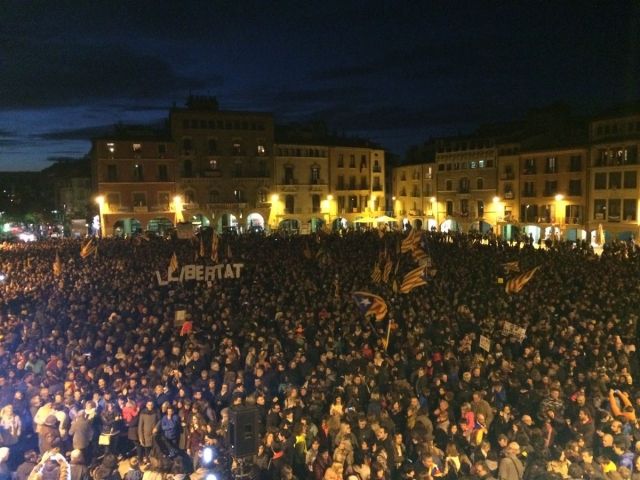 Hundreds-of-thousands of Catalans took to the streets demanding independence / Image: fair use
Hundreds-of-thousands of Catalans took to the streets demanding independence / Image: fair use
Despite all this, the turnout of 81.94 percent was the highest, not only for Catalan Parliament elections, but also for Spanish parliamentary elections in Catalonia and in the whole of Spain. The Spanish ruling party (the PP) was reduced to three seats in Catalonia and the pro-independence bloc has once again won an overall majority in the Catalan Parliament. We are therefore in exactly in the same situation as before.
Whatever happens in the next few months, nothing will ever be the same either in Catalonia or in Spain. Forces have been unleashed that will tear apart the false and hypocritical ‘consensus’ that cheated the people of a genuinely democratic alternative to the hated Franco dictatorship. Rajoy and the PP are the true inheritors of that regime, which brutally trampled over the people in the past and continue to trample over them today.
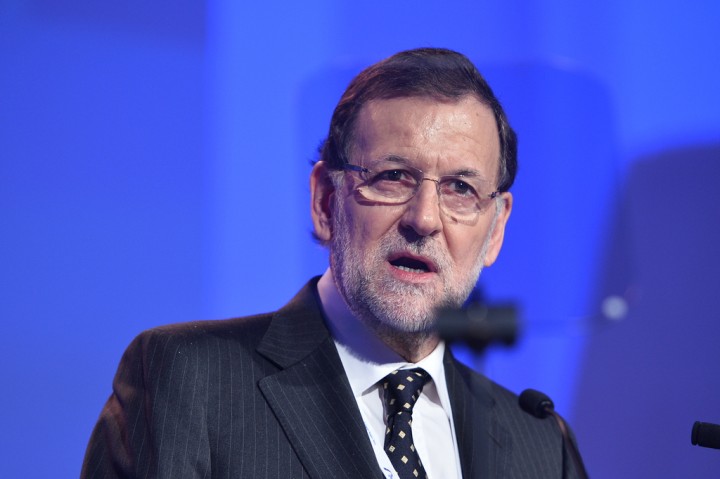 Mariano Rajoy’s PP represents the continuation of large parts of the Franco regime / Image: Flickr, EPP
Mariano Rajoy’s PP represents the continuation of large parts of the Franco regime / Image: Flickr, EPP
The mass movements in Catalonia are only the first symptom of revolt against that dictatorship. The same spirit of revolt will manifest sooner or later in the whole country.
Riches and poverty
The discontent growing everywhere is an expression of extreme polarisation: the concentration of capital that Marx predicted long ago and which has furiously been denied by economists and sociologists ever since.
Who nowadays can deny the truth of Marx’s prediction? The concentration of Capital has taken place in a laboratory fashion. Fewer than 200 giant corporations now control world trade. Obscene wealth is concentrated in the hands of a few. In 2017 alone the world’s billionaires increased their combined global wealth by a fifth.
According to Josef Stadler, the Global Head of the Ultra High Net Worth division at UBS, today “wealth inequality is at its highest since 1905”. The globe’s richest one percent owns half the world’s wealth, according to a new report highlighting the growing gap between the super-rich and everyone else.
A report from Credit Suisse showed that the world’s richest people increased their wealth from 42 percent at the height of the 2008 financial crisis to 50.1 percent in 2017, or $140tn (£106tn). The report informs us:
“The share of the top 1 percent has been on an upward path ever since [the crisis], passing the 2000 level in 2013 and achieving new peaks every year thereafter.” The bank said “global wealth inequality has certainly been high and rising in the post-crisis period.”
The increase in wealth among the already very rich led to the creation of 2.3 million new dollar millionaires over the past year, taking the total to 36 million. “The number of millionaires, which fell in 2008, recovered fast after the financial crisis, and is now nearly three times the 2000 figure.”
These millionaires – who account for 0.7 percent of the world’s adult population – control 46 percent of total global wealth that now stands at the staggering figure of $280 trillion.
That is one side of the picture. At the other end of the spectrum, the world’s 3.5 billion poorest adults each have assets of less than $10,000 (£7,600). Collectively these people, who account for 70 percent of the world’s working age population, account for just 2.7 percent of global wealth. For millions of people this is a life or death question.
In 2017 across 45 countries, an estimated 83 million people required emergency food assistance – over 70 percent more than in 2015. And in 2018, 76 million could need Emergency Food Assistance.
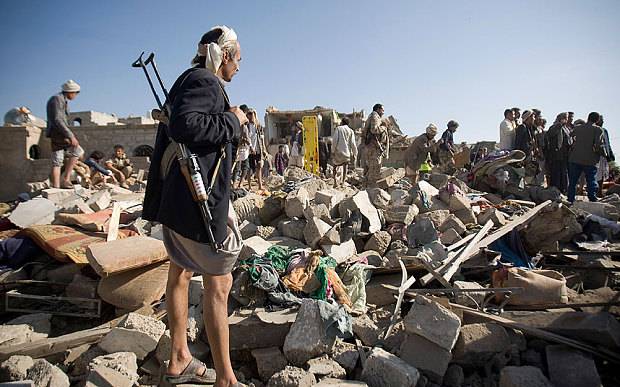 Houses destroyed near Sanaa, Yemen by Saudi Arabia / Image: public domain
Houses destroyed near Sanaa, Yemen by Saudi Arabia / Image: public domain
Yemen is a particularly scandalous case. As a result of the barbaric war of aggression waged by Saudi Arabia and its allies, 17 million Yemenis do not have enough to eat, and over 3 million children, and pregnant and nursing women, are acutely malnourished. The hypocritical western media has largely ignored these atrocities perpetrated by the Saudi gangsters who are deliberately using starvation as a weapon of war.
Importance of the subjective factor
In recent years the Middle East has presented a picture of black reaction: war, civil war, bloodshed, religious fanaticism, massacres and chaos. The key to this situation is to be found in three countries: Egypt, Turkey and Iran. These are the countries where the proletariat is strongest and has revolutionary traditions. From a superficial standpoint, in all three, reaction is firmly in the saddle. But such an appraisal is fundamentally flawed.
The Egyptian masses did everything in their power to change society. It was the absence of leadership – and that alone – that led the magnificent 2011 movement into a blind alley. And since nature abhors a vacuum, the vacant space was filled by Sisi and the other reactionary army generals. As a result the Egyptian workers and peasants have been obliged to pass once more through the harsh school of reaction. But sooner or later they will rise again. The Sisi dictatorship is a ramshackle hut built on chicken’s legs. Its fatal weakness is the economy. The people of Egypt need bread, work and houses, which the generals are powerless to provide. Future explosions are inevitable.
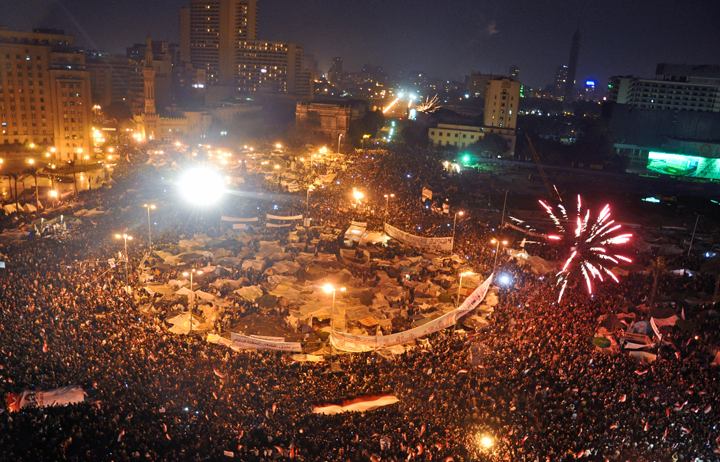 Tahrir Square during the 2011 Egyptian Revolution / Image: Flickr, Jonathan Rashad
Tahrir Square during the 2011 Egyptian Revolution / Image: Flickr, Jonathan Rashad
In Turkey also, the revolutionary potential of the masses was shown by the uprising of 2013. That was eventually crushed, and Erdogan succeeded in diverting the attention of the masses by playing the card of Turkish nationalism and unleashing a brutal war against the Kurds. But nationalism cannot put bread on the table of millions of underprivileged Turks. Sooner or later a reaction against the regime will begin. And there are signs that it has already begun. We must watch Turkey closely in the next period as one of the keys to the Middle East.
Most of the world’s population is young. And at least 60 percent of young people between 15 and 24 years of age are unemployed worldwide. The simmering discontent of these young people was what sparked off the Arab Revolution a few years ago.
Now we see the same phenomenon repeated on the streets of towns and cities all over Iran. As usual this movement arose suddenly, without warning, like a heavy stone thrown into the waters of a calm pond. It shocked and amazed all the self-styled experts, especially those tired old cynics of the so-called left, whose principal stock-in-trade is scepticism and a deep-rooted belief that nothing will ever happen and that the masses will never move. All these ‘clever’ people stood with their mouths open at this movement that, according to them, was never going to happen.
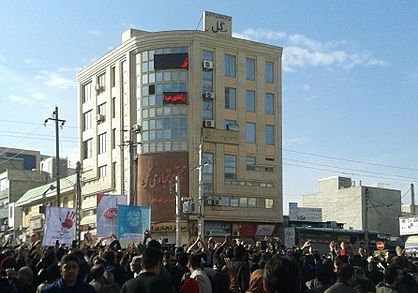 There have been major protests across Iran / Image: public domain
There have been major protests across Iran / Image: public domain
“But these demonstrations are smaller than those of 2009,” the sceptics hasten to reassure us. Yes, smaller but much more radical, more impetuous, bolder and less cautious. With the speed of light, the demands of the protesters passed from economic to political demands, from unemployment and the high cost of living to demanding the overthrow of the entire regime. The protesters tore down posters of the Supreme Leader Ayatollah Khamenei – something extremely dangerous and virtually unheard of in Iran. There were even some reports of attacks on portraits of the late Ayatollah Khomeini himself.
Who were these protesters? They were mainly young, poor, unemployed people, not the university students who predominated in all earlier protests. They were unorganized, belonged to no political group and had no guiding idea, except for one thing: a burning desire for change. But that is the starting point of every revolution.
The regime was shaken to the core. It understands that this movement, precisely because of its class content, represents potentially far more dangerous threat than the millions who came onto the streets of Tehran in 2009. Their vacillations seem at first sight to be incomprehensible. Given the relatively small size of the demonstrations, the powerful repressive apparatus in the hands of the mullahs would surely be more than enough to have snuffed out this protest – as a man snuffs out a candle with two fingers?
And yet, as I write these lines, the regime has not yet launched a serious campaign of repression. The dog barks but does not bite. Why? There are two main reasons. Firstly the regime is split down the middle and far weaker than it was in the past. Secondly, they understand that behind the demonstrating youths are millions of Iranians who are tired of years of grinding poverty, unemployment and rising food prices.
They have long since lost faith in the mullahs who pretended to stand for morality and honesty, but are just as corrupt as the officials of the Shah were in the past. Any move against the protesters would provoke an angry backlash that would see millions on the streets again, only this time they would be workers, not just students and middle-class people.
 The Iran protests are bolder than in 2009 (if smaller) but lack organisation / Image: fair use
The Iran protests are bolder than in 2009 (if smaller) but lack organisation / Image: fair use
At this time it is difficult to predict exactly what the future of this rebellion will be. Its main weakness is the lack of organization. Without a clear plan of action and a firm grasp of tactics and strategy the movement may dissipate its energies in a series of uncoordinated actions that can easily degenerate into mere rioting. That is what the regime is anxiously waiting for. Once again we come back to the central question: that of revolutionary leadership.
In 1938 Leon Trotsky wrote that one could reduce the crisis of humanity to the crisis of leadership of the proletariat. There have been many revolutionary movements in the recent past: in Egypt, in Turkey, in Iran, in Greece. But in every case the masses were thwarted by the lack of the subjective factor: a revolutionary party and leadership. If in Egypt at the time of the overthrow of Mubarak there had existed even a small revolutionary party, the entire situation would have been different.
Let us remind ourselves that in February 1917 the Bolsheviks had only 8,000 members in a huge, mainly peasant, country of 150 million. Yet in the space of just nine months they had transformed themselves into a mighty party capable of leading the workers and peasants to the seizure of power.
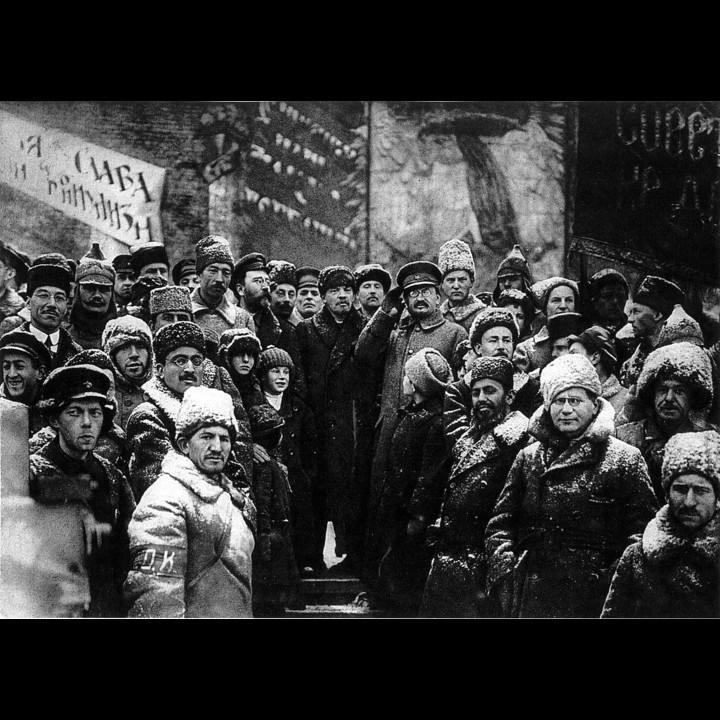 In February 1917 the Bolsheviks had only 8,000 members, but in nine months they had transformed into a mighty party capable of leading the workers and peasants to the seizure of power / Image: public domain
In February 1917 the Bolsheviks had only 8,000 members, but in nine months they had transformed into a mighty party capable of leading the workers and peasants to the seizure of power / Image: public domain
As we enter the New Year, we can be confident that new revolutionary possibilities will present themselves in one country after another. Iran shows that sharp and sudden changes are implicit in the whole situation. We must be prepared to seize every opportunity to spread the ideas of Marxism, to build our forces, to connect with the masses, beginning with the most advanced layers, and to build the forces of Marxism everywhere.
As to the cowards, apostates and sceptics who deny the perspective of revolution, we can only shrug our shoulders and repeat the defiant words uttered by Galileo Galilei: Eppur si muove [And yet it moves].
